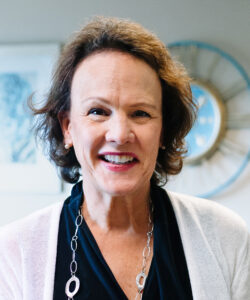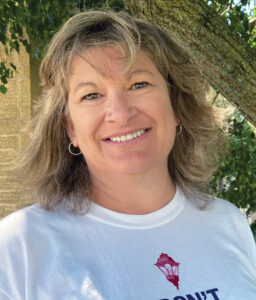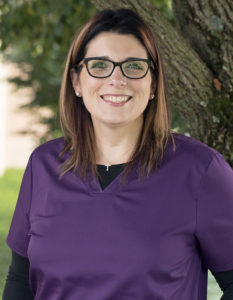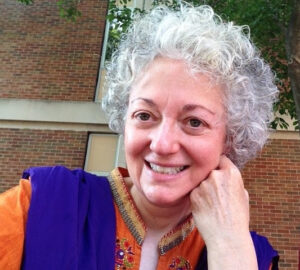Finding the Hope in Hospice … for 10 Years
 Myra Badorf is the Assistant Director of Development for Homeland Hospice and on August 16th celebrated her 10-year anniversary. Upon looking back, she shares her thoughts with us.
Myra Badorf is the Assistant Director of Development for Homeland Hospice and on August 16th celebrated her 10-year anniversary. Upon looking back, she shares her thoughts with us.
>>>
“Caregiving often calls us to lean into love we didn’t know possible.” ~ Tia Walker, author
I’ve worked for Homeland Hospice for 10 years now … never on the front lines like so many of my colleagues, but never far from the heartbreaking stories of untimely and sometimes tragic deaths, to the beautiful descriptions of the passing of an elderly person who lived a good life full of love of family, success in a career, a strong faith and peace … even welcoming death in the end.
My mother is 89 and my father is 88, and my family and I are blessed to still have both in our lives. Plus, I have never had anyone close to me ever needing the services of hospice. But I too know that it is a matter of time. With two parents looking at the doorstep of 90, I expect it now, and I will welcome the support hospice services have to offer when that time comes.
Here at Homeland Hospice I have the good fortune of reading the letters and cards of thanks that we receive from the many family and friends of those we have cared for over the years. Many of them include a monetary donation as a way to express their appreciation and gratitude, for which we are thankful.
These letters make me proud of the people I work with—our nurses, social workers, aides, chaplains, volunteers. All of them deal with important life issues daily, never wavering from this calling of hospice. I don’t know what burdens they carry for our patients, how it effects their off hours, or their health, but what I do know—to do this, they must have what we refer to as “the heart of hospice.” You see, it takes a special person, especially in the medical field to do this kind of work. Nurses are trained to heal. They are also trained to solve problems—which is an essential skill for anyone providing hospice care. In most cases healing will not come, but the opportunity to ensure a peaceful, pain-free death, managing complicated symptoms … well, our staff are second to none.
“Death is not the enemy sir, indifference is! You treat a disease, you win, you lose. You treat a person, I guarantee you, you’ll win, no matter what the outcome.” ~ Patch Adams

 The end-of-life journey is a time when extra comfort and support is needed as patients and their families are often fatigued physically, emotionally and spiritually. A hospice caregiver is often faced with situations that can change daily or even hourly. Frequent medications, dressing changes, safety, toileting, feeding, and emotional support easily fills their day, and in many cases, their night too. In addition, there are situations in which a spouse or caregiver may never have prepared a meal. The patient is the one who always handled that daily task.
The end-of-life journey is a time when extra comfort and support is needed as patients and their families are often fatigued physically, emotionally and spiritually. A hospice caregiver is often faced with situations that can change daily or even hourly. Frequent medications, dressing changes, safety, toileting, feeding, and emotional support easily fills their day, and in many cases, their night too. In addition, there are situations in which a spouse or caregiver may never have prepared a meal. The patient is the one who always handled that daily task. Some of our volunteers simply cook a little extra when they are preparing a meal for their own family. Church group often use the left-overs from a community or church meal to make a yummy dish or soup.
Some of our volunteers simply cook a little extra when they are preparing a meal for their own family. Church group often use the left-overs from a community or church meal to make a yummy dish or soup.
 She was the type of old lady I want to be. She was sassy and opinionated. Mostly confused but, had moments of crystal lucidity. Her eyes were set on a fellow resident and no amount of reasoning could dissuade her that this was going to be her boyfriend. She loved Diet Coke, but, fountain only please… Her accomplishments were many in life during a time when such feats were limited to those with an Adam’s apple.
She was the type of old lady I want to be. She was sassy and opinionated. Mostly confused but, had moments of crystal lucidity. Her eyes were set on a fellow resident and no amount of reasoning could dissuade her that this was going to be her boyfriend. She loved Diet Coke, but, fountain only please… Her accomplishments were many in life during a time when such feats were limited to those with an Adam’s apple. About 6 years ago, I was fortunate to be able to retire from a long career as a health care lawyer. After I retired I had to figure out what I wanted to do when I “grew up.” I decided I wanted to work directly with patients instead of working at a desk. While it was definitely not easy to find such a job without any experience and with my “maturity” eventually I was hired as a nurse’s aide in the Neurology Unit at Harrisburg Hospital. This was great because they provided the training I needed for the job. Being a nurse’s aide was about as different from a legal desk job as any job could be! It was fast paced, hands on, and never a dull moment! It provided me the opportunity to meet all types of people, from all walks of life and many cultures, to provide hands-on care and comfort, and to be a part of the patients’ and their families’ lives for a short period of time. Often, patients were so grateful for my small service that it was overwhelming to me. I learned so much about people and the world in general. It was one of the most meaningful experiences of my life.
About 6 years ago, I was fortunate to be able to retire from a long career as a health care lawyer. After I retired I had to figure out what I wanted to do when I “grew up.” I decided I wanted to work directly with patients instead of working at a desk. While it was definitely not easy to find such a job without any experience and with my “maturity” eventually I was hired as a nurse’s aide in the Neurology Unit at Harrisburg Hospital. This was great because they provided the training I needed for the job. Being a nurse’s aide was about as different from a legal desk job as any job could be! It was fast paced, hands on, and never a dull moment! It provided me the opportunity to meet all types of people, from all walks of life and many cultures, to provide hands-on care and comfort, and to be a part of the patients’ and their families’ lives for a short period of time. Often, patients were so grateful for my small service that it was overwhelming to me. I learned so much about people and the world in general. It was one of the most meaningful experiences of my life.
